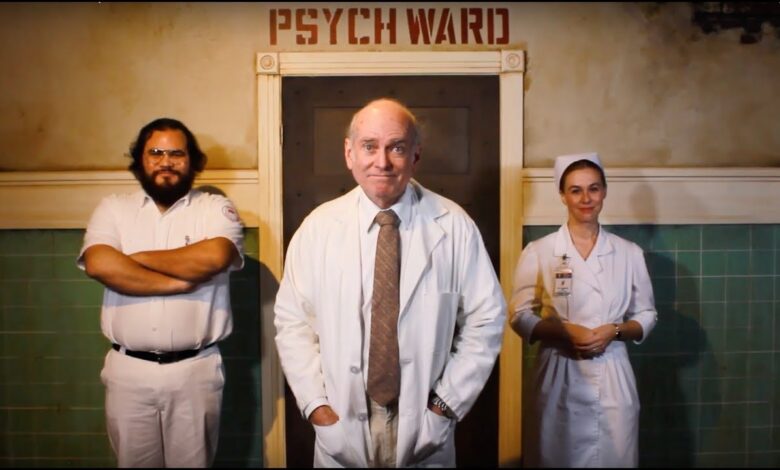Psych Ward vs Mental Hospital: Key Comparisons and Insights

In the labyrinthine landscape of mental health care, two prominent structures stand out: psych wards and mental hospitals. These facilities serve as crucial pillars in the support and treatment of individuals grappling with various mental health challenges. Yet, the nuances differentiating the two are often obscured, leading to confusion and misconceptions. In this comprehensive guide, we embark on a journey to unravel the mysteries surrounding psych wards and mental hospitals, shedding light on their distinct characteristics, functions, and significance in the realm of mental health care.
Historical Context
To comprehend the essence of psych wards and mental hospitals, one must delve into the annals of history. The roots of mental health care trace back to ancient civilizations, where individuals exhibiting aberrant behavior were often ostracized or subjected to crude forms of treatment.
Over time, societal perceptions evolved, giving rise to dedicated institutions aimed at providing care and support to those grappling with mental illness. The emergence of psych wards and mental hospitals marked a pivotal juncture in the trajectory of mental health care, signifying a shift towards more structured and specialized forms of treatment.
Definitions and Scope
At first glance, the terms “psych ward” and “mental hospital” may appear synonymous, yet subtle distinctions exist between the two. A psych ward, short for psychiatric ward, typically refers to a designated unit within a hospital or medical facility specializing in the acute treatment of individuals experiencing mental health crises. In contrast, a mental hospital, also known as a psychiatric hospital or mental health facility, encompasses a broader spectrum of services, providing both acute and long-term care to patients with various mental health disorders.
Setting and Atmosphere
Step through the doors of a psych ward, and you’ll find yourself immersed in an environment teeming with activity yet tinged with an undercurrent of tension. The atmosphere is characterized by a sense of urgency, as medical professionals work tirelessly to stabilize patients in acute distress.
The setting is often clinical, with sterile white walls and utilitarian furnishings, reflecting the facility’s primary focus on crisis intervention and short-term treatment. Despite the clinical facade, moments of empathy and compassion permeate the space, as staff members strive to instill hope amidst the chaos.
In contrast, a mental hospital exudes a more subdued ambiance, reminiscent of a sanctuary cocooned from the outside world. Here, patients find solace in the tranquil surroundings, conducive to healing and introspection. The atmosphere is imbued with a sense of serenity, fostering a therapeutic milieu where individuals can embark on their journey towards recovery at their own pace. Unlike the transient nature of a psych ward, mental hospitals offer a semblance of stability and continuity, providing long-term care to those in need of ongoing support.
Admission Process
The journey into a psych ward or mental hospital begins with the admission process, a pivotal step in accessing vital mental health care services. For individuals grappling with acute psychiatric crises, admission to a psych ward often occurs through emergency departments or crisis intervention services.
Upon arrival, patients undergo a comprehensive assessment to determine the severity of their condition and formulate an appropriate treatment plan. The admission process prioritizes the safety and well-being of patients, ensuring they receive timely intervention and support during moments of acute distress.
In contrast, admission to a mental hospital entails a more deliberate and structured process, typically involving referrals from mental health professionals or community agencies. Patients may undergo pre-admission assessments to ascertain their suitability for long-term care and treatment within the facility. The admission process emphasizes collaboration and communication between various stakeholders, including patients, families, and treatment providers, to ensure a seamless transition into the mental health care system. Additionally, safeguards are in place to uphold patient rights and autonomy throughout the admission process, fostering a sense of dignity and empowerment.
Treatment Approaches
Central to the mission of both psych wards and mental hospitals is the delivery of evidence-based treatment approaches tailored to the unique needs of each individual. In a psych ward, the focus is primarily on crisis stabilization and symptom management, with interventions aimed at addressing acute psychiatric symptoms and ensuring the safety of patients.
Treatment modalities may include medication management, psychotherapy, and behavioral interventions, administered in a structured and intensive manner to facilitate rapid stabilization and resolution of acute symptoms.
In contrast, a mental hospital offers a more comprehensive array of treatment options, ranging from acute crisis intervention to long-term rehabilitation and recovery-oriented care. Here, patients have access to multidisciplinary teams comprising psychiatrists, psychologists, nurses, and other allied health professionals, who collaborate to design individualized treatment plans.
Therapeutic interventions may encompass a combination of medication management, psychotherapy, group therapy, and psychosocial rehabilitation, tailored to address the complex interplay of biological, psychological, and social factors contributing to mental illness.
Staffing and Expertise
The backbone of any mental health care facility lies in its dedicated and compassionate staff, whose expertise and commitment shape the quality of care delivered to patients. In a psych ward, the staffing model is often characterized by a high staff-to-patient ratio, reflecting the acute and intensive nature of the services provided. A multidisciplinary team of psychiatrists, psychiatric nurses, social workers, and other mental health professionals collaborates to ensure comprehensive assessment, treatment, and support for patients in crisis.
Similarly, mental hospitals boast a diverse and specialized workforce equipped to address the complex needs of patients with chronic and severe mental illness. In addition to psychiatrists and psychiatric nurses, mental hospitals employ a range of allied health professionals, including psychologists, occupational therapists, and recreational therapists, who contribute to the holistic care of patients. The staffing model emphasizes continuity of care, with teams working collaboratively to promote recovery, rehabilitation, and community reintegration for individuals with long-term mental health needs.
Patient Rights and Regulations
Within the realm of psych wards and mental hospitals, safeguarding patient rights and autonomy is paramount, guided by a framework of ethical principles and legal regulations. Patients receiving care in these facilities are entitled to a range of rights, including the right to informed consent, confidentiality, and dignity.
Additionally, regulations such as the Mental Health Act outline procedures for involuntary admission and treatment, balancing the need for intervention with respect for individual autonomy and self-determination.
In a psych ward, efforts are made to ensure that patients understand their rights and actively participate in decision-making regarding their treatment and care. Staff members undergo training to uphold ethical standards and navigate complex ethical dilemmas that may arise in the course of clinical practice.
Similarly, mental hospitals prioritize patient-centered care, empowering individuals to exercise their rights and make informed choices about their treatment and recovery journey. Collaborative approaches, such as advance directives and shared decision-making, promote autonomy and respect for patient preferences within the context of mental health care.
Duration of Stay
The duration of stay in a psych ward or mental hospital varies depending on the nature and severity of the individual’s condition, as well as the goals of treatment. In a psych ward, the focus is on providing short-term crisis intervention and stabilization, with the aim of facilitating rapid improvement and discharge back to the community. Patients typically stay in a psych ward for a few days to a couple of weeks, during which time they receive intensive treatment and support to address acute psychiatric symptoms.
In contrast, the duration of stay in a mental hospital may span weeks, months, or even years, depending on the individual’s treatment needs and progress towards recovery. Mental hospitals provide a continuum of care, ranging from acute inpatient services to long-term residential care and transitional support programs. The length of stay is determined by factors such as the severity of
You read also more





